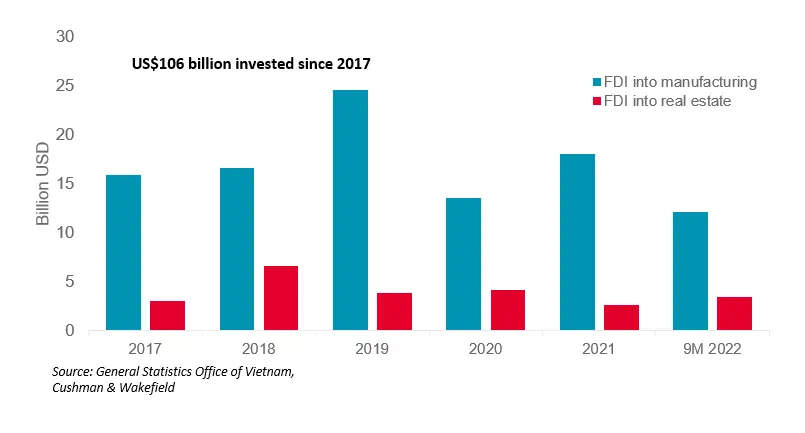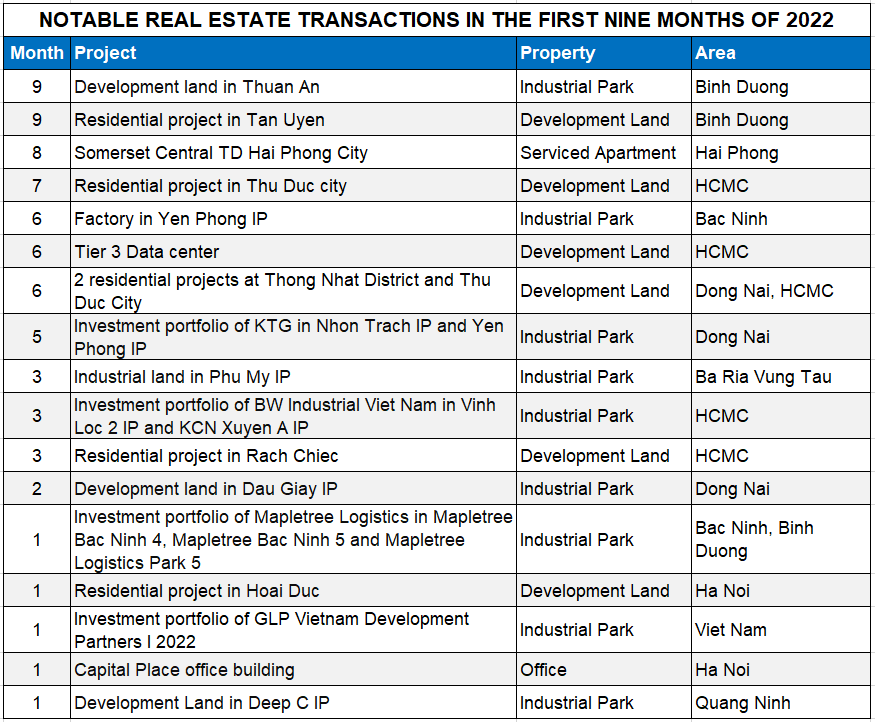The Covid-19 outbreak caused great disruptions to the Vietnam real estate market in the year 2020 to 2021. However, production and business activities have since gradually regained growth momentum, and the Government's policy to push socio-economic recovery and development has shown positive effects since the beginning of this year.
In the first 9 months of 2022, Vietnam attracted about US$15.4 billion in foreign investment, up 16.2% over the same period last year. Real estate investment continues to rank second among sectors attracting the most foreign direct investment with over US$3.5 billion received, accounting for 18,7% of the total amount of investment. GDP in the first nine months of 2022 increased by 8.83% over the same period last year, the highest growth in the past decade. This shows that Vietnam is still among the markets with great potential for investment in the Asia Pacific region.

With the economy back on track and the real estate M&A market having been gathering growth momentum for the past 9 months, Cushman & Wakefield estimated that the transaction volume of M&A deals published in the first 9 months of 2022 reached more than US$1.5 billion. This is mainly recorded in the office, industrial, residential and hotel sectors in key cities such as Ho Chi Minh City, Hanoi, Binh Duong, and Dong Nai.
Demand for operating office buildings in the city center area is still on the rise. In the first month of 2022, CapitaLand Development successfully transferred the Grade-A office building Capital Place in the center of Hanoi for US$550 million, setting a new record in transaction value of office buildings in the Hanoi market. “The supply of Grade A & B office space is still limited in HCMC and Hanoi, totaling almost 3 million sqm. Growing FDI inflows have fueled demand for this sector, as office properties which have been put into operation and can generate steady profit streams continue to be the type of asset foreign investors search for,” said Trang Bui, CEO of Cushman & Wakefield Vietnam.
In the residential sector, Keppel Land signed an agreement to buy 49% shares in 3 land plots in Bac An Khanh Urban Area (Hoai Duc, Hanoi) of Phu Long Real Estate Joint Stock Company for a total price of about US$119 million, to develop a housing project that will include 1.020 apartments and 240 shophouses. Keppel Land also announced that they are conducting divestment in a 30-hectare housing project in Ho Chi Minh City.
Gamuda Land is in the process to buy a 5.6 hectares development land plot in Binh Duong new city, priced at almost US$54 million.
The serviced apartment company The Ascott Limited also announced a US$9.45 million investment for 90% of the shares in the Somerset Central TD Hai Phong City serviced apartment project of Thuy Duong Investment JSC, located on Le Hong Phong Street, Hai Phong City, and will take control of the development of the 132 serviced apartments in the building.
In addition, the US investment fund Warburg Pincus announced an investment of US$250 million into Novaland, in order to increase the land bank and develop Novaland's existing projects in strategic locations, taking advantage of the gradually improved infrastructure in the South. Two foreign capital investment funds VinaCapital and Dragon Capital also announced an investment of US$103 million in Hung Thinh Land.
The market has also witnessed a transfer deal of the Kenton Node project from Tai Nguyen to Novaland. The project was then renamed Grand Sentosa, with more than 1,640 apartments in Ho Chi Minh City. Another notable deal is Masterise Homes acquiring Saigon Binh An project, its name was then changed to The Global City with an area of 117 hectares, located within proximity of the Long Thanh - Dau Giay highway.
Investors continue to have an optimistic view of the industrial real estate market, with an increase in the number of investors who seek to buy land funds or factories in industrial zones. In early 2022, GLP announced the establishment of GLP Vietnam Development Partners I with a total investment value of US$1.1 billion into six logistics center projects with a total area of up to 900,000 sqm. Mapletree Investments also transferred 3 logistics projects to Mapletree Logistics Trust with a total transaction value of US$95.9 million.
Logos Property Services and Manulife Financial have also invested more than US$80 million in a new logistics project with an area of 116,000 sqm in Dau Giay Industrial Park, Dong Nai. BW Industrial has announced the acquisition of approximately 74,000 sqm of land in Bac Tien Phong Industrial Park in Quang Ninh Province, developed by DEEP C. CapitaLand Development also announced the signing of a memorandum of understanding on investment cooperation with the People's Committee of Bac Giang province for the development of an urban - industrial - logistics project with a total area of more than 400 hectares across the province with a committed value of US$1 billion.
Among notable deals is the purchase of 6 logistics projects by Boustead Singapore from Khai Toan Joint Stock Company in industrial parks in Dong Nai and Bac Ninh, at US$84.2 million. Apart from traditional asset types, in June, an investment transaction into a data center was announced by Gaw Capital Partners, based in Hong Kong. This is a Tier-3 data center with an area of 6.056 sqm in HCMC High Tech Park.
From our observation, a majority of transactions were made by experienced investors who are well-versed in the volatility and demand pattern of the market and continuously look for good profit margins or portfolio expansion in the region. These deals were in negotiation during the pandemic and achieved agreement in 2022, which explains the surge in recorded deals in the past 9 months.
However, since October, property M&A market activities have slowed down due to recent allegations related to multiple real estate and stock companies, amidst tightened bank credit flow and restrained bond issuance. This has led to foreign investors taking a more conservative approach, especially institutional investors, financial institutions, and new entrants to the market. Some investors have pressed the 'pause' button to restructure their investment strategy to adapt to the new situation. While these investors are still well-funded, new major investments will be paused for the time being, except for ongoing deals.
The real estate market typically goes through four stages before forming a new cycle. The stages can be described as follows: Recovery, Expansion, Hyper-supply, and Recession. It seems that Vietnam has had a growth spurt in recent years and is now showing signs of slowing down. But it can also be said that the real estate market is going through a strong purification period to head towards a more sustainable and healthy development.
Looking back at a similar period in the previous cycle around March 2008, the market was overheated in 2007, coupled with the impact of the global financial and economic recession, financial and monetary tools seemingly could not be controlled when the lending rate increases continuously, at times up to 25%, and inflation peaked at 23%. The real estate market fell into a recession cycle and the FDI flow also froze. This capital inflow started to recover in late 2013 and early 2014. And since then, buyers have had access to more affordable credit, low inflation, and high economic growth that contributed to Vietnam’s ranking as one of the fastest-growing economies in the ASEAN region.
“Real estate is cycle-based, and every cycle will have its waves. Like the repeating seasons, real estate moves in patterns that you can observe and predict. One who understands this model will be able to seize the opportunities available in each period. It must be noted, just like nature, the real estate cycles can sometimes become unstable, as influenced by domestic and international macroeconomic factors. The real challenge for investors is how to succeed in a market that moves at its own pace,” said Trang Bui.
However, there are grounds to believe that real estate investment capital flows will improve in the last months of 2022, thanks to a series of related reforms in management policy, notably: Decree No. 65/2022/ND-CP which allows enterprises to issue bonds to implement investment programs and projects, and to restructure their own debts.
Looking back over the past 32 years, Vietnam has gone through four cycles of market development, and many have started to question what the future of the real estate market will look like. At a property market forum conducted by Cushman & Wakefield in October, most experts were optimistic that the property market would continue to stay strong, and the reforms of regulations for real estate from the Government are needed to position Vietnam as a major economy full of potential.
“Each of us is a genius and the market is like a game of musical chairs, every time the music stops, someone must lose when there is no chair for them. Just make sure you're one of the first to sit down, which is a question I will leave for you to answer!”

Source: RCA, Cushman & Wakefield Vietnam
Xuan Pham
 Serviced Office Global Market Report 2022
Serviced Office Global Market Report 2022  How to make a QR code for your office for customer health declaration during the Covid-19 pandemic
How to make a QR code for your office for customer health declaration during the Covid-19 pandemic  VIETNAM NEWS HIGHLIGHTS - DECEMBER 2021
VIETNAM NEWS HIGHLIGHTS - DECEMBER 2021  “Hub & Spoke” - A promising trend for the office rental market in Ho Chi Minh City and the potential in Tan Phu
“Hub & Spoke” - A promising trend for the office rental market in Ho Chi Minh City and the potential in Tan Phu  Ho Chi Minh City plans to resume all economic activities after January 15, 2022, what should enterprises do to re-start their business?
Ho Chi Minh City plans to resume all economic activities after January 15, 2022, what should enterprises do to re-start their business?  “Shopping” for a virtual office during the Covid-19 pandemic is surprisingly beneficial.
“Shopping” for a virtual office during the Covid-19 pandemic is surprisingly beneficial. 2 Bis - 4 - 6, CJ BUILDING
No. 6 Le Thanh Ton street, Sai Gon Ward, HCMC
Tel: +84 28 6255 6800 | Fax: +84 28 6255 6801
Email: leasing@cjbuilding.com.vn


